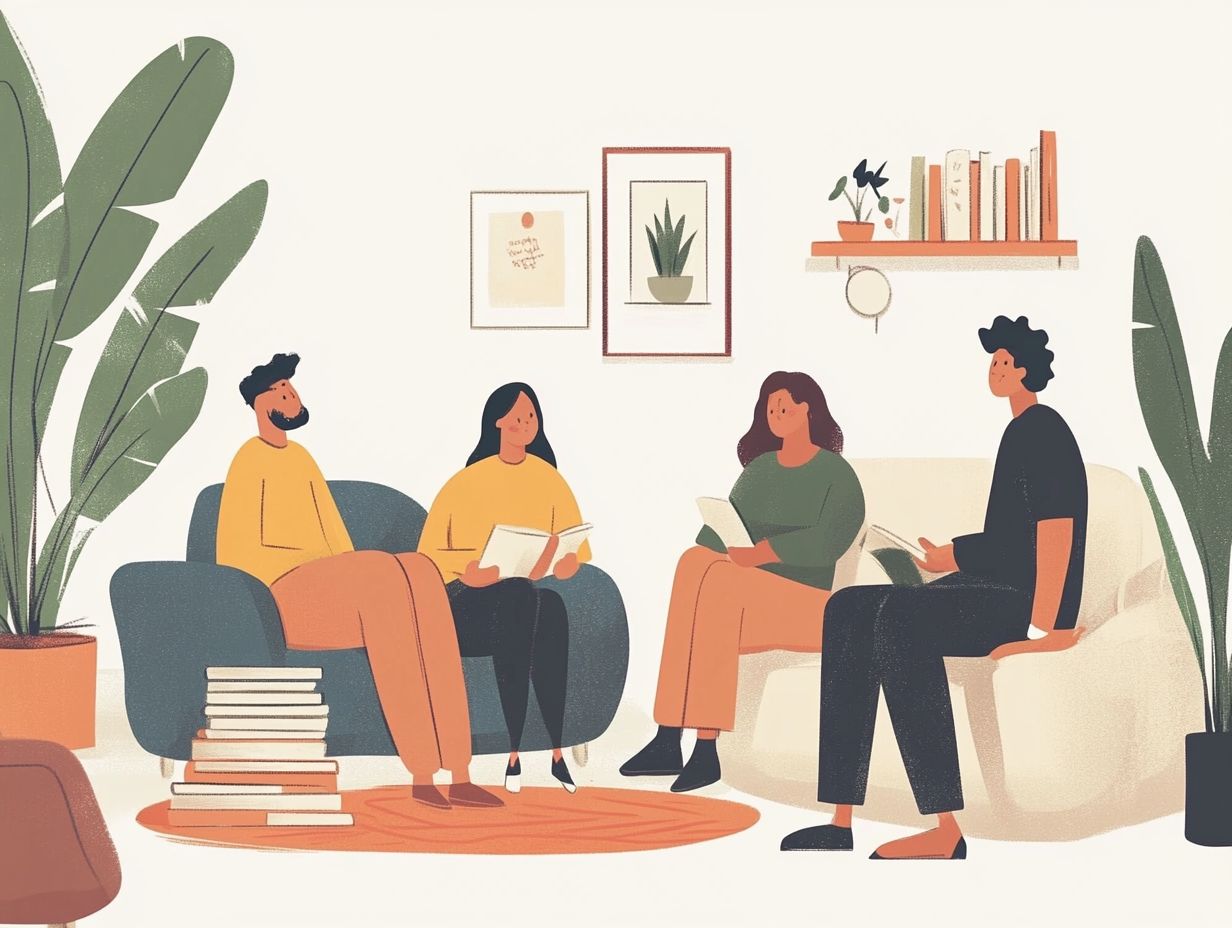What Are the Most Common Misconceptions About Anxiety?
Anxiety is a complex mental health issue that impacts millions. It often suffers from a veil of misconceptions and is classified as a common mental disorder.
In this article, we delve into the true essence of anxiety and uncover the essential distinctions between anxiety and everyday stress management. We dismantle the widespread myths that fuel stigma and shed light on how these misunderstandings can harm those grappling with anxiety.
Discover effective ways to support those facing anxiety, including recognizing the symptoms and fostering a more compassionate and informed community.
Join us on this journey to uncover the facts and champion understanding of effective treatment options.
Contents
Key Takeaways:

- Anxious Weak: Anxiety is a common mental health issue, not a sign of weakness.
- Facts Over Fiction: Many beliefs about anxiety are unfounded. Educate yourself to dispel myths.
- Empathy is Key: Misconceptions about anxiety can cause stigma. Show support to those struggling.
Understanding Anxiety
It s important to understand anxiety, especially since it ranks among the most prevalent mental disorders affecting many adults in the United States. Anxiety often shows itself in many ways, including persistent symptoms that can profoundly affect your daily life, relationships, and overall well-being.
Anxiety can manifest through emotional distress and physical symptoms like hyperventilation, which is when you breathe very quickly and can make you feel lightheaded.
The Diagnostic and Statistical Manual (DSM-5) classifies anxiety disorders, emphasizing their widespread nature and the urgent need for effective treatment options, such as cognitive behavioral therapy (CBT), a type of therapy that helps you understand and change your thoughts and behaviors, and medication.
Defining and Differentiating Anxiety
Anxiety is that unsettling feeling of unease or fear that can take on various forms, such as generalized anxiety disorder (GAD) and social anxiety disorder. Each comes with its own unique set of symptoms, like panic attacks that can arise in various social situations, leading to a tendency to avoid stress altogether.
The triggers and manifestations of these disorders can differ greatly. GAD often brings about a constant sense of worry over everyday matters, while social anxiety disorder focuses more on an intense fear of social interactions and the judgment from others.
For instance, restlessness in GAD may contrast sharply with the blushing or trembling experienced during social anxiety disorder, stemming from irrational fears.
Recognizing these nuances is crucial. Getting the right treatment often depends on a personalized approach, guided by healthcare providers skilled at accurately diagnosing the specific type of anxiety disorder you may have, whether it s generalized anxiety disorder or social anxiety disorder.
With professional support, you can develop tailored coping strategies and relaxation techniques, leading to a significant enhancement in your quality of life.
Myths and Misconceptions About Anxiety
You may find that numerous myths and misconceptions surround anxiety, creating a haze of misunderstanding around this prevalent mental disorder, its symptoms, and available treatment options.
This can lead to stigma and hinder effective anxiety management strategies, making it harder for individuals to seek the necessary professional help. It’s essential to navigate through this misinformation to foster a clearer understanding and approach to anxiety.
Debunking Common Beliefs

Many people have misconceptions about anxiety that hold them back. Let’s set the record straight. Common misconceptions, such as the belief that it stems from a mere lack of willpower or can be easily managed alone, can perpetuate harmful narratives regarding the true severity of anxiety symptoms. It’s also important to understand what the myths about pet anxiety are, as they can affect how we care for our furry friends.
This perspective can also downplay the importance of effective treatment options like cognitive behavioral therapy (CBT), a type of talk therapy that helps you change negative thinking patterns, and medication.
Individuals dealing with anxiety often find themselves ensnared in a cycle of self-doubt, thinking they should simply ‘tough it out.’ This mindset fails to recognize the biological and psychological complexities inherent in anxiety disorders, including their impact on emotional distress.
Emotional distress can significantly affect daily functioning and overall quality of life. Research consistently shows that professional treatment, including CBT, can effectively alleviate symptoms by reshaping negative thought patterns and behaviors.
By reframing anxiety as a legitimate health condition rather than a personal shortcoming, you can give yourself the power to seek the support you deserve and engage with evidence-based interventions that have been proven effective.
The Impact of Misconceptions on Mental Health
Misinformation about anxiety can profoundly impact your mental health, resulting in heightened psychological and emotional distress, including anxiety symptoms and chronic anxiety. This often leads to avoidance of social situations and a hesitance to seek assistance from healthcare providers.
Avoidance ultimately exacerbates the challenges you face. Misinformation can amplify anxiety triggers and contribute to chronic anxiety, leaving you feeling isolated and unsupported in your struggles.
Isolation can hold you back from using effective coping strategies, such as breathing exercises and relaxation techniques. For example, when you encounter falsehoods about anxiety or the effectiveness of treatments, it s easy to shy away from seeking professional help, fearing it won’t truly meet your needs.
This avoidance can lead to a cycle of withdrawal, where you further isolate yourself due to a lack of clear and reliable information about anxiety triggers and treatment strategies. When accurate information is easily accessible, it gives you the power to make informed decisions about your mental health.
This opens up avenues for support that bolster your resilience. By gaining a deeper understanding of your condition, you are more likely to engage with therapeutic communities, learn about effective treatment options, or practice self-help strategies.
Addressing Misconceptions About Anxiety
You must tackle misconceptions about anxiety to empower yourself and others by embracing education and advocacy. By promoting accurate healthcare advice, you can highlight effective treatment options, such as CBT and medication, as well as the availability of valuable resources within community health centers for mental illness.
This approach not only empowers individuals but also fosters a more informed and supportive environment for those facing anxiety.
Take the first step today by seeking help and understanding anxiety better. You re not alone in this journey!
Correcting and Educating Others

Correcting misconceptions about anxiety and educating others can significantly dispel anxiety myths. This creates a supportive atmosphere and encourages individuals to seek professional guidance from healthcare providers, ultimately leading to improved coping strategies and effective treatments.
By participating in community discussions, workshops on coping strategies, and social media campaigns, you play a vital role in sharing accurate information about anxiety and effective treatment. These platforms provide invaluable opportunities to share personal experiences, debunk myths, and offer real-life insights.
Workshops equip you with essential tools and techniques for managing anxiety effectively, including the use of relaxation techniques. Social media serves as a contemporary means for outreach and education.
Encouraging open dialogue not only helps reduce stigma but also invites others to share their stories. This fosters a robust network of support that can include workshops and community health centers. You can take the initiative by sharing informative resources about anxiety management and personal anecdotes, further creating a welcoming environment of understanding and compassion within your community.
Ways to Support Those with Anxiety
Supporting someone with anxiety requires cultivating an environment that acknowledges their challenges. It s essential to offer access to effective coping strategies, like relaxation techniques, helpful resources like community health centers, and professional assistance from healthcare providers.
By doing so, you empower them to navigate their struggles with greater confidence and resilience.
Creating a Supportive Environment
You can create a supportive environment by showing understanding, compassion, and keeping the lines of communication open. It’s crucial to act now to build this supportive space, as it can significantly alleviate emotional distress and lessen the impact of social anxiety.
To cultivate such an environment, you can employ active listening techniques and relaxation techniques. This allows those with anxiety to express their feelings without interruption or judgment, validating their experiences and promoting trust.
Developing clear communication pathways, such as regular check-ins or supportive dialogues, gives the power to individuals to articulate their needs comfortably.
By providing resources like workshops on coping strategies or access to mental health professionals you encourage proactive engagement with anxiety management. This equips individuals with practical tools to navigate challenging situations.
These actionable steps can transform a community into a sanctuary where empathy and understanding flourish, promoting effective anxiety treatments and personal growth.
Frequently Asked Questions
What Are the Most Common Misconceptions About Anxiety?

Many people mistakenly believe that anxiety is simply excessive worrying or an inability to manage stress effectively. In reality, anxiety is a complex mental disorder that can lead to a range of symptoms, including panic attacks and chronic anxiety.
One of the most common misconceptions is that anxiety is just normal worrying. In reality, it is a mental health disorder that can significantly impact a person’s daily life and functioning.
Are only shy or introverted people affected by anxiety?
No, anxiety can affect anyone regardless of their personality type, whether they have underlying traits of anxiety or have faced childhood issues. While some people may be more prone to developing anxiety, particularly due to personal conflict or social situations, it can affect anyone at any point in their life. Understanding anxiety is critical for everyone.
Is it true that anxiety is not a real illness? (Anxiety Disorder)
Anxiety is a very real and serious illness. It is a diagnosable mental health disorder and can have a significant impact on a person’s physical, emotional, and social well-being.
Can Anxiety Be Cured with Medication? (Understanding Anxiety)
Medication can help manage anxiety symptoms. However, it is not a cure.
Therapy, self-care, and lifestyle changes are also crucial for effective management.
Is Anxiety Just a Sign of Weakness? (Mental Illness)
No, feeling anxious does not indicate weakness. Anxiety is a complex mental health disorder influenced by various factors.
Can t People with Anxiety Just Calm Down and Relax? (Coping Strategies)
Relaxation techniques can help, but managing anxiety isn’t that simple.
For many, anxiety is a chronic condition needing ongoing support.






